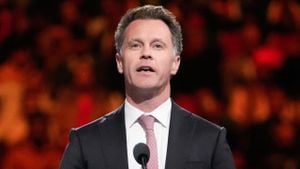The recent budget announcement by Chancellor Rachel Reeves has stirred up significant conversation across the UK about its economic implications. Specifically, the changes to national insurance contributions, particularly the rise to 15% beginning April 2025, are expected to challenge numerous sectors, including charities, local councils, and most prominently, businesses.
During the Great Northern Conference hosted by The Yorkshire Post, Reeves acknowledged the tough reality awaiting businesses, charities, and local authorities due to the national insurance hike. "I'm not going to pretend it's going to be easy for businesses, or charities, or local authorities to absorb these costs," she stated. The chancellor emphasized the government's commitment during the election not to raise taxes on working individuals, reflecting on the hardships faced by those who have already been burdened by tax increases.
Notably, the increase has ignited discussions among business leaders about its potential repercussions. Celebrity chef Tom Kerridge voiced concerns, predicting widespread restaurant closures as costs escalate. He estimated the budget change would equate to over £800 per employee annually for businesses like his. Kerridge reiterated his alarm, noting existing high-profile closures within the restaurant industry, hinting at broader economic ramifications if this trend continues.
Adding fuel to the fire, the Conservatives have criticized Labour for not explicitly differentiatiation between employee and employer contributions, claiming the government breached its manifesto by implementing these tax hikes. Reeves countered this, asserting it was necessary to raise taxes on wealthier individuals and businesses to support the overall economy.
Meanwhile, Goldman Sachs published findings indicating the budget's tax changes may have larger-than-expected impacts on employment and inflation. According to their analysis, the nationwide insurance rise, along with lowered thresholds for contributions, poses risks not captured by standard predictions. While the Office for Budget Responsibility anticipates minimal labor market shifts, Goldman Sachs noted these tax changes might have broader influences.
Researchers found payroll taxes heavily influence hiring practices, especially among lower earners. The potential drop of 50,000 jobs, as predicted by the fiscal watchdog, may not capture the full scope of repercussions, with analysts forecasting unemployment might rise by 0.2 percent temporarily before stabilizing.”
Empirical studies hint at tax increases being linked to wages, where firms often skew costs onto low-wage earners, amplifying employment repercussions. This trend raises serious questions about the sustainability of jobs, as employers react to added costs through wage adjustments or price increases.
The treasury's calculations suggest simultaneous consumer price hikes due to businesses adjusting to the mandated cash flow, with Goldman Sachs projecting these shifts might cause prices to rise by 0.3%, slightly higher than earlier estimates. This intersection of taxation and inflation reflects complex economic dynamics, especially concerning low-income workers reliant on stable wages.
Despite Reeves' previous commitments to engage with the CBI without imposing future taxes, the Chancellor still refrained from guaranteeing no additional tax increases. Pressed by uncertainties within the economy, she claimed it was impossible to predict every economic fluctuation. "Now, I can't write five years' worth of budgets in just five months - we don't know what might happen. But I can give businesses confidence from this budget...we have wiped the slate clean, and we will never have to do another budget like this again," she proclaimed.
This balanced discussion reveals the tangled relations between governmental policies, business health, and the everyday lives of citizens — especially those working at the lower end of wage scales. The feedback from businesses will be pivotal as the chancellor’s strategy is put to the test when the new insurance requirement goes live next spring.
With the stark realities looming over the UK’s economic horizon, the true extent of the budget’s impact may remain to be seen as businesses grapple with their new financial realities and the population deals with its validated anxieties.



